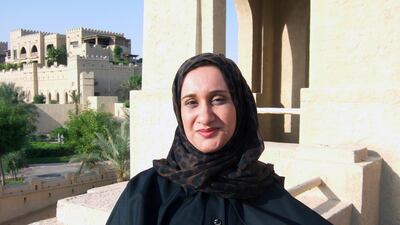For the past week, eight of the region's most exciting new writers have been taking part in the International Prize for Arabic Fiction's annual nadwa, set up five years ago to mentor new storytellers.
This year, the workshop at Qasr Al Sarab Desert Resort – sponsored by His Highness Sheikh Hamdan bin Zayed Al Nahyan – was led by two of the Arab world's most famous novelists: Mohammed Achaari and May Menassa. A fantastic opportunity, then, for one award-winning UAE storyteller to hone her craft: we caught up with the winner of this year's Dubai Cultural Prize, Lulwah Al Mansuri, and asked her what being on the IPAF nadwa meant for her.
The workshop is meant to give you some space to work on a new piece of fiction, surrounded by like-minded people. Is that how it worked out?
Well, I was the sole Emirati and I have to say I am passionate about writing but filled with doubt that I don't have enough fiction-writing tools to do myself justice. So this is why the IPAF nadwa was so good for me – I needed to take calm and confident steps and make a steady improvement in my writing.
The IPAF nadwa was, in a way, a safe haven for me – I will now walk under the light of the sun into the world of the novel!
So what was the best part of it for you?
I've genuinely come to have a brotherhood in literature with the other people on the nadwa. I loved them all. And the best part was the warm sentiment that brought us all together, whether it was inside the nadwa hall or outside of it. There was a real sense of affection, love and generosity.
How important was the input of Mohammed Achaari and May Menassa? What specifically did you learn from them?
I learnt how to separate myself from what I'm writing and leave things to the interpretation of the reader. That's quite a difficult thing to do, but having the confidence to allow the reader to work stuff out for themselves is really important. Also, I learnt to create several different voices in my stories – if only so my reader doesn't sink into a pit of boredom!
It must have been great to get away from daily life and really concentrate on your writing.
It was. I had to adapt to writing in isolation, but it was good to break my old writing habits. The real change was chasing after ideas for what I would write about on the nadwa, rather than waiting for them to come to me as I usually do. It was tiring, but the words began to flow after a while.
How do you think the IPAF nadwa might change your work?
Well, I definitely understand the world of the novel much better, and my horizons are far broader now, too. I really benefited from the knowledge and intellectual experience of the participating writers – all my colleagues, with no exception, came from the literary elite.
So how does it feel to be 'one to watch'?
One of eight! But it is great that there are skilled eyes scanning the Arab literary scene for promising and beautiful writers. Obviously I'm delighted, but the nadwa is really about grasping the opportunity to encourage a broader Arab cultural movement. It's not just about me.
But you must have been delighted to win the Dubai Cultural Prize earlier this year for your short story collection, The Village Which Sleeps In My Pocket.
Of course. It really gave me encouragement. And winning it also pushed me to trust my pen, to produce more passionate writing and to work hard on developing my writing so that the next collection will shine even brighter.
And what do you like writing about?
It's difficult for a writer to explain the characteristics of their stories, but I'm definitely interested in unconditional love and the paths leading to God. I find that I gravitate towards things that have no pretence, if you see what I mean. Things that are natural, non-materialistic. It's about looking for the humanity in everything.
Finally, you discussed contemporary Arab literature more generally at the nadwa. How do you feel it's progressing?
Well, just from the texts of all the participating writers there were so many different themes, styles and narrative techniques. I think that diversity is reflected across the Arab world, actually, which is really healthy. At the end of the day, how good Arab literature is right now is all opinions, both from readers and writers. Perhaps in future years the nadwa should have a critic on board as well as the professional novelists, so that the discussion could be richer. But just having the discussions was fantastic for me.
artslife@thenational.ae

Love and paths to God
An Emirati was among eight writers chosen to participate in the International Prize for Arabic Fiction's annual nadwa, designed to mentor new storytellers.
Most popular today
